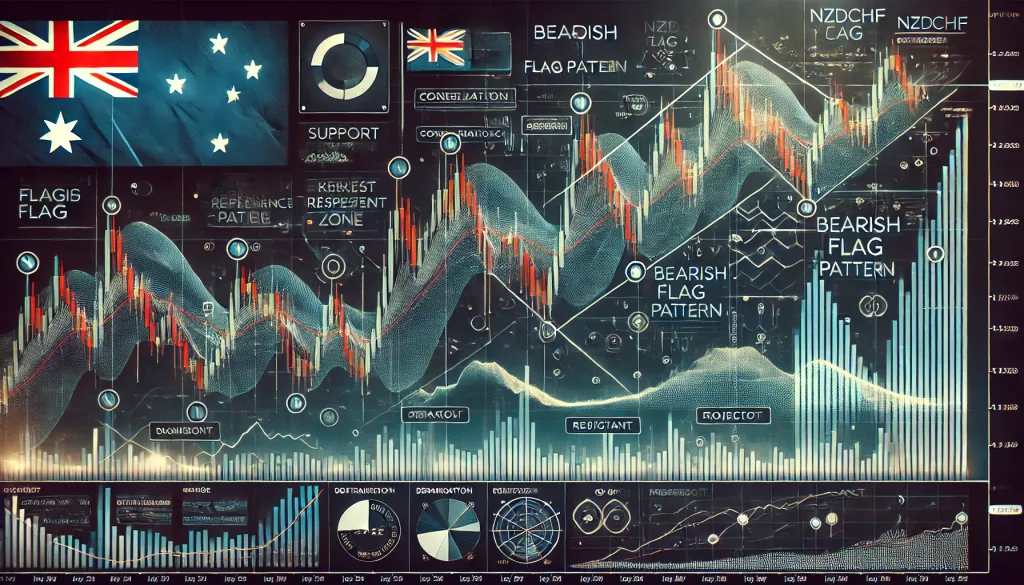The NZDCHF Bearish Flag: The Hidden Playbook for Spotting and Profiting from This Pattern

Why Most Traders Miss the Bearish Flag (And How You Can Profit Instead)
Picture this: You’re staring at your chart, and NZDCHF is forming what looks like a staircase to heaven. But wait—seasoned traders know that this so-called ‘climb’ is actually a trap. This is where the bearish flag enters the stage, quietly deceiving unsuspecting traders before unleashing its true colors—a downward price movement that wipes out the unprepared.
In this article, we’re diving deep into the bearish flag pattern on NZDCHF, uncovering why it happens, how to identify it like a pro, and (most importantly) how to profit from it before the crowd catches on.
Let’s get into the insider tactics and hidden strategies most traders overlook.
What is the NZDCHF Bearish Flag and Why Should You Care?
A bearish flag is a continuation pattern that signals a brief consolidation in an overall downtrend before the price continues to decline. Think of it as a short-lived rally where weak hands get lured in before the smart money resumes the dominant downtrend.
How to Spot a Bearish Flag on NZDCHF
- Preceding Downtrend: The price moves sharply downward before entering the flag phase.
- Flag Formation: A temporary upward or sideways consolidation, forming a parallel channel or wedge.
- Breakout Confirmation: A downward breakout from the flag signals a continuation of the trend.
???? Secret Tip: If the pullback (flag) retraces more than 50% of the prior move, it’s likely a reversal, not a flag!
Why the NZDCHF Bearish Flag Works Like a Charm
Many traders mistakenly believe that a small rally in a downtrend means the trend is reversing. The truth? This is institutional traders shaking out weak retail positions before resuming their downward push.
???? Expert Quote:
“The bearish flag is one of the most reliable continuation patterns, boasting a success rate of over 70% when combined with volume confirmation.” – John Murphy, Technical Analysis of the Financial Markets
This pattern is your golden ticket to catching high-probability trades with well-defined entry and exit points.
Underground Tactics: How to Trade the NZDCHF Bearish Flag Like an Insider
1. Entering the Trade at the Right Moment
⏳ Patience is Key – Many traders jump in too early, mistaking the flag for a breakout before confirmation. The best approach is to wait for a strong bearish candle closing below the flag’s support.
???? Pro Tip: Use the Fibonacci retracement tool to measure the flag’s retracement level. An ideal flag should stay within the 38.2% to 50% retracement zone of the prior down move.
2. Stop-Loss Placement to Avoid Being Stopped Out
Your stop-loss should be just above the flag’s highest point. A common mistake? Placing it too close and getting stopped out by minor price fluctuations.
???? Tactical Move: A safer stop-loss strategy is to use the Average True Range (ATR) to measure volatility and adjust accordingly.
3. Profit Targets: Maximizing Your Gains
The best target is measured by taking the height of the initial flagpole and projecting it downward from the breakout point. This method ensures you capture the full potential of the move.
???? Secret Exit Strategy: Use a trailing stop to lock in profits as the price drops. This way, you maximize gains while reducing risk.
The Hidden Factors That Make NZDCHF Bearish Flags More Powerful
1. Economic Correlations: The Swiss Franc Edge
The Swiss Franc (CHF) is a safe-haven currency. Whenever there’s economic uncertainty, the CHF strengthens, pushing NZDCHF lower. This means that bearish flags on NZDCHF have a higher probability of playing out during risk-off sentiment.
2. Liquidity Traps: Institutions Love This Setup
Big players use the bearish flag fake-out strategy. They push prices up slightly within the flag to shake out weak hands before dumping the pair lower. Understanding this psychological warfare gives you an edge.
???? Watch for false breakouts to the upside before a real move down. Institutions often hunt for stop-losses before the big drop.
Case Study: Recent NZDCHF Bearish Flag in Action
In December 2024, NZDCHF formed a textbook bearish flag after a strong downtrend. Many traders thought the pullback signaled a reversal. However, once price broke below the flag, it plummeted over 150 pips in just three days!
???? Key Takeaway: The traders who waited for confirmation made significant profits, while those who jumped in too early got caught in a liquidity trap.
Final Thoughts: How to Stay Ahead of the Market
If you master the bearish flag pattern on NZDCHF, you’ll gain a serious edge over the competition. Just remember:
✅ Wait for confirmation before entering.
✅ Use proper stop-loss placement to avoid shakeouts.
✅ Factor in market sentiment and CHF correlations.
Ready to level up your trading? ????
???? Get free access to real-time Forex news, expert insights, and elite strategies: StarseedFX
—————–
Image Credits: Cover image at the top is AI-generated
PLEASE NOTE: This is not trading advice. It is educational content. Markets are influenced by numerous factors, and their reactions can vary each time.

Anne Durrell & Mo
About the Author
Anne Durrell (aka Anne Abouzeid), a former teacher, has a unique talent for transforming complex Forex concepts into something easy, accessible, and even fun. With a blend of humor and in-depth market insight, Anne makes learning about Forex both enlightening and entertaining. She began her trading journey alongside her husband, Mohamed Abouzeid, and they have now been trading full-time for over 12 years.
Anne loves writing and sharing her expertise. For those new to trading, she provides a variety of free forex courses on StarseedFX. If you enjoy the content and want to support her work, consider joining The StarseedFX Community, where you will get daily market insights and trading alerts.
Share This Articles
Recent Articles
The GBP/NZD Magic Trick: How Genetic Algorithms Can Transform Your Forex Strategy
The British Pound-New Zealand Dollar: Genetic Algorithms and the Hidden Forces Shaping Currency Pairs
Chande Momentum Oscillator Hack for AUD/JPY
The Forgotten Momentum Trick That’s Quietly Dominating AUD/JPY Why Most Traders Miss the Signal
Bearish Market Hack HFT Firms Hope You’ll Never Learn
The One Bearish Market Hack High Frequency Traders Don't Want You to Know The

